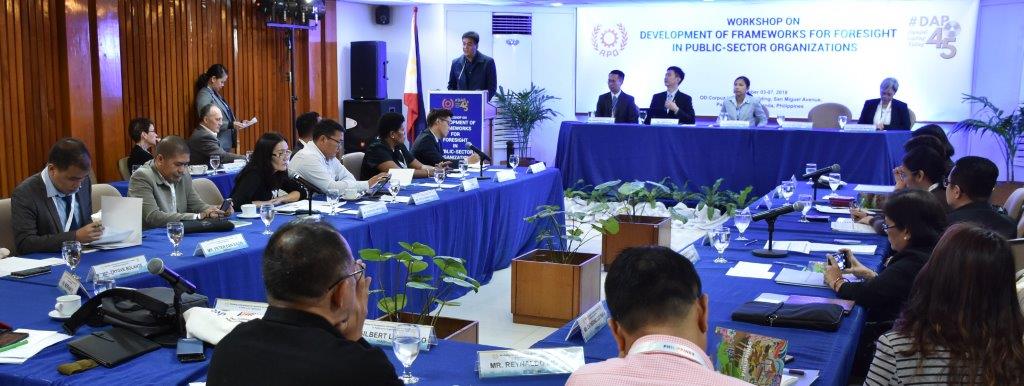
Select Page
With increasing complexity in public policy formulation and socioeconomic development agendas, it is critical to equip public-sector and corporate planners with the principles of strategic foresight and scenario planning. As part of its capacity-building series on strategic foresight, the Asian Productivity Organization (APO) along with the Development Academy of the Philippines (DAP) conducted a workshop on Development of Frameworks for Foresight in Public-sector Organizations in Manila, 3–7 September 2018.

The five-day workshop was opened by APO Director for the Philippines Dr. Adoracion Navarro. DAP President and CEO Engelbert C. Caronan, Jr. presided over the inaugural session, while APO Secretariat Research and Planning Department Acting Director Joshua Lau gave the opening message. The workshop focused on creating a pool of experts on strategic foresight and scenario planning who can serve as in-country trainers to increase organizational readiness for a more future-ready public sector in the face of a volatile, uncertain, complex, ambiguous world.
The workshop aimed to inculcate foresight thinking into development and planning processes in the public sector through the creation of national scenarios relevant to member countries’ needs and challenges. It was conducted by two APO-assigned international experts: foresight practitioner and Founder of Thinking Futures Maree Conway of Australia; and Director of Looking Good, Feeling Great and Co-founder of the Australian Center for Strategic Foresight Marcus Barber.
Strategic foresight as a planning tool refers to a stepwise method of anticipation to identify opportunities and potential threats that may occur in the long-term future. Apart from stretching out the time dimension of strategic planning, which may show the bigger picture of complex matters, among the benefits of the institutionalization of foresight is encouraging organizational shifts toward becoming learning enterprises.
A foresight system requires constant scanning of the external environment and its analysis to create plausible futures to be achieved as the process for deriving strategic options for execution. It can serve as a useful tool for planning in the public sector, particularly in allocating resources for strategic actions identified.

Photos: DAP